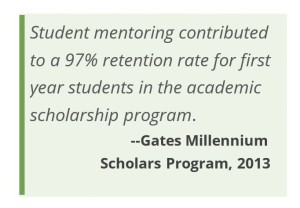Every year, universities strive for excellent national rankings and recognition for their educational offerings. Part of those rankings come from high graduation and job placement rates. In addition, universities that offer a range of enriching and engaging activities attract the top students, which also translates into better rankings. So how do university mentoring benefits fit into these activities? Mentoring is an attractive extracurricular to offer incoming and current students as well as alumni. Mentoring is a smart use of resources, connecting students and alumni for support, learning and networking as they move through their university experience and enter working life.
At Chronus, we have many university customers. Here are what we see as the top advantages of mentoring programs for universities who want to engage their students and alumni for long term benefits.
Benefits of University Mentoring Programs
1. Mentoring College Students Improves Job Placement Rates
When an economy is tough, college graduates often suffer. Many schools have been struggling to offer their students better career services that lead to solid job opportunities after college. Higher education institutions with low placement rates have been criticized for not doing more to prepare students for a tough job market, and this affects their overall academic reputation. So how do universities provide better career placement for students to maintain an excellent reputation?
Smart universities are improving job placement rates after graduation by developing students and alumni through mentoring programs. These development programs connect and enhance a student’s networks to provide them with better tools for their job search. By matching students to a mentor in their field of study, students can get a better understanding of the career paths and resources available to them, as well as receive resume and job advice from professionals within their desired professions. Students can also plug in early to a network of alumni working professionals for vital connections that can land them their first job. Alumni mentors are a great, local resource for universities to use to enhance a student’s overall college and job search experience.
As an example, the Leeds School of Business at the University of Colorado, Boulder reported that students who participated in their mentoring program were 40% more likely to have a job upon graduation.
2. Mentoring Increases Student Retention Rates

By offering a mentoring program, students receive encouragement right from the start from those who have been through similar experiences. Whether the mentors are older students, alumni or young professionals, mentors can connect with young students and provide invaluable advice and guidance. They answer the real, everyday questions and can become an advocate for a student, often providing a more personal level of support than what is available from a busy college professional advisor.
Get mentoring resources straight to your inbox. Subscribe today!
3. Mentoring Engages Alumni
Alumni are an important resource for every university or higher education institution, and are an essential part of a university’s reputation. They represent the success that students can achieve from a particular degree or program offered by the school. Alumni success can also translate into vital volunteer support and donation funding for the school. So how do you connect and engage with alumni in a way that promotes giving back time and resources to their alma mater?
Offering alumni the chance to become mentors is a great way to encourage them to remain connected with your institution. Utilizing a strong alumni network as a mentor base also gives current students a chance to ask questions of someone who has been in their shoes and can relate to them more easily. Alumni-to-alumni mentoring programs also offer universities an opportunity to connect older classes with younger ones. These mentoring connections allow recent graduates to receive career advice from those with more experience in similar professions. This strengthens an alumni support network through engagement and builds a community that encourages giving back to the school that helped make them successful.
4. Mentoring Provides an Enriching College Experience
So how does university mentoring benefit students and alumni in terms of their overall experience? Enriching activities like mentoring allow students and alumni to feel more connected to their school, and creates a community culture that is rewarding and engaged. Mentoring programs are strong resources that ensure students are receiving the full support they need to be successful during and after college. As a tool, mentoring helps transition students from life as a new student to graduation, and then on to their full career. It promotes academic and career readiness, and this leads to success as both a student and a professional. Overall, providing a rewarding mentoring experience that turns students and alumni into successful professionals enhances a university’s reputation.
Chronus Software for University Mentoring Programs
When you’re ready to consider implementing a mentoring program for university mentoring benefits at your institution, we hope you’ll consider Chronus. Chronus is a leading provider of mentoring software that makes it easy to start, manage, and measure a university mentoring program. With automated features like bulk matching and mentoring program workflows, software can greatly reduce administrative time, effort and cost.

